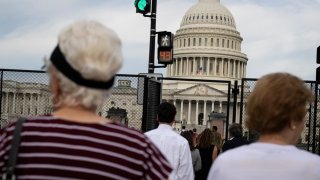
- Certain rules that reduce pensioners' Social Security benefits have been in place for decades.
- House lawmakers voted to approve a bill that would nix those rules.
- Critics say more comprehensive Social Security reform should be prioritized instead.
A bipartisan bill to change Social Security benefit rules for pensioners passed in the House of Representatives on Tuesday, with 327 lawmakers voting to support the measure.
WATCH ANYTIME FOR FREE
>Stream NBC10 Boston news for free, 24/7, wherever you are. |
Now, the proposal heads to the Senate, where the chamber's version of the bill has 62 co-sponsors, "surpassing the majority needed to pass the bill on the U.S. Senate floor and send it to the president's desk to be signed into law," Reps. Abigail Spanberger, D-Va., and Garret Graves, R-La., co-leaders of the bill, said in a joint statement.
The proposal — called the Social Security Fairness Act — would repeal rules that reduce Social Security benefits for individuals who receive pension benefits from state or local governments.
Get updates on what's happening in Boston to your inbox. Sign up for our >News Headlines newsletter.
It would eliminate the windfall elimination provision, or WEP, that reduces Social Security benefits for individuals who worked in jobs where they did not pay Social Security payroll taxes and now receive pension or disability benefits from those employers. About 3% of all Social Security beneficiaries — about 2.1 million people — were affected by the WEP as of December 2023, according to the Congressional Research Service.
More from Personal Finance:
What Trump's presidency could mean for the housing market
Trump's win may put popular student loan forgiveness program at risk
What the Fed's latest interest rate cut means for your money
The bill would also eliminate the government pension offset, or GPO, which reduces Social Security benefits for spouses, widows and widowers who also receive pension checks. As of December, about 1% of all Social Security beneficiaries — or 745,679 individuals — were affected by the GPO, according to the Congressional Research Service.
Money Report
These rules, which have been in effect for decades, reduce the incomes of certain retired police officers, teachers, firefighters and other public servants, Graves said during a speech Tuesday on the House floor.
"This has been 40 years of treating people differently, discriminating against a certain set of workers," Graves said.
"They're not people that are overpaid; they're not people that are underworked," he said.
Supporters call bill a 'step in the right direction'
The National Committee to Preserve Social Security and Medicare said the House vote on the Social Security Fairness Act is a "step in the right direction" and a "bipartisan victory for public sector employees and their families."
"We have long advocated for the repeal of the WEP and GPO provisions, though we would have preferred that Congress take up the more comprehensive improvements in Rep. John Larson's Social Security 2100 Act," Max Richtman, president and CEO of the National Committee to Preserve Social Security and Medicare, said in a statement.
Larson's proposal, which has 188 House co-sponsors, would also repeal the WEP and GPO, while also implementing other temporary benefit increases. To help pay for those changes, it would require people with more than $400,000 in income to pay more Social Security payroll taxes.
On Tuesday, Larson voted against the Social Security Fairness Act, as well as another bill, the Equal Treatment of Public Servants Act. The latter bill would use a new formula for Social Security retirement and disability benefits for pensioners rather than eliminate the WEP. It would not change the GPO.
The bill, which was proposed by Rep. Jodey Arrington, R-Texas, failed when it was brought up for a vote.
"I could not vote for the bills on the floor tonight because they are not paid for and therefore put Americans' hard-earned benefits at risk," Larson said in a statement. "It would hurt most deeply the five million of our fellow Americans who receive below poverty checks, and almost half of all Social Security recipients who rely on their earned benefits for the majority of their income."
Critics say the bill will weaken Social Security
The Social Security Fairness Act would add an estimated $196 billion to deficits over the next decade, the Congressional Budget Office has estimated. It would also move Social Security's trust fund depletion dates closer by an estimated six months, according to the Committee for a Responsible Federal Budget.
"The long-term solvency of Social Security is an issue that Congress must address," Spanberger said on the House floor on Tuesday.
"But that is a separate issue from allowing Americans who did their part, who contributed their earnings, for them to retire with dignity," she said.
However, critics say Social Security's funding woes should be a priority for Congress now. The program's actuaries project the trust fund used to pay retirement benefits may be depleted in 2033, at which point 79% of benefits will be payable.
"This is not the right policy," said Romina Boccia, director of budget and entitlement policy at the Cato Institute. "It's what special interests were pushing, and politicians are responsive to their demands."
Though the alternative bill proposed by Arrington would not address the GPO, it would provide a "fairer formula" for the WEP, Boccia said. However, broader changes are needed to shore up the program's finances.
"We should reform Social Security so that it provides basic income security to the most vulnerable Americans in old age without adding to the debt or tax burden that younger workers face," Boccia said.






